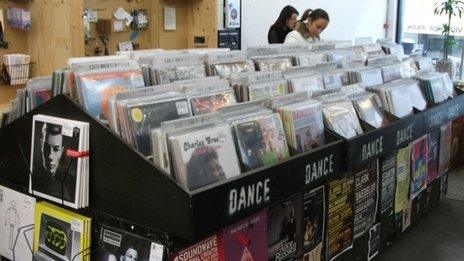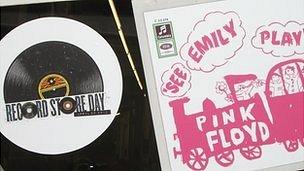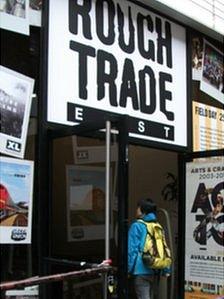Indie music shop in show of strength
- Published
- comments

Rough Trade East is benefiting from the popularity of vinyl and the success of Record Store Day
On a lazy midweek morning in the East End of London, one of the UK's hippest and most influential record shops is experiencing the calm before the retail storm.
Right now, barely more than half a dozen potential customers are browsing the racks at Rough Trade East, while the sound of David Bowie's comeback album fills the air.
Except for a few discreetly positioned signs, there is little indication of the turmoil expected this Saturday, when the store is likely to see its biggest crowds of the year.
In common with more than 200 other independent record shops throughout the country, Rough Trade's two London outlets are taking part in Record Store Day (RSD), a celebration of popular music culture with particular appeal for those who collect rare vinyl releases.

An early hit single by Pink Floyd is being reissued for Record Store Day
And this year, the event comes as a salutary reminder that despite the recent collapse of retailer HMV, now set to continue in diminished form under new ownership, the UK's music shops are still a force to be reckoned with.
Rough Trade is certainly on a roll at present. Last week, at trade paper Music Week's 2013 awards, it was voted Retail Brand of the Year, ahead of rivals including Amazon, iTunes and Spotify.
Buoyed by this success, Rough Trade East's staff are braced for a busy session at the tills on Saturday.
"It's lots of fun, in its own chaotic and stressful way," says Cordelia behind the counter. "We have people queuing up outside from midnight, just for the unique releases that come out on that day.
"It gets really full, but it's all very civilised. People don't fight over the records - it's more, 'You have that one and I'll have this one.' It's a very special way to experience a record shop."
Brand power

Stephen Godfroy has seen off the sceptics
"We've enjoyed double-digit growth since opening Rough Trade East back in 2007," says the firm's co-owner, Stephen Godfroy. "The first quarter of 2013 shows this trend continuing, with a 25% year-on-year sales growth performance."
The 5,000-sq-ft (500-sq-m) shop on Dray Walk, just off Brick Lane, is housed in the former loading bay of the old Truman brewery. When it opened, external as the UK's biggest music-only specialist shop, just before the start of the credit crunch, many observers were sceptical about its prospects.
But Mr Godfroy was convinced that High Street chains such as HMV were putting off customers because they had "commoditised" music - and that the solution was to bring back "the joy of browsing".
Nearly six years later, time seems to have proved him right. As he puts it, "the big red herring of HMV has been seen, particularly by the media, for all its failing glory".
This year's RSD offers him a chance to showcase that approach. The annual event began in the US in 2007, but soon spread to other countries. This year will be its sixth in the UK.
The big draw for collectors is that every year, a strictly limited series of seven-inch singles, LPs and the odd CD by a wide range of artists is made available, for as long as stocks last and only through participating shops. Once they're gone, they're gone.

Rough Trade East is the UK's biggest music-only store
Sought-after items for 2013 range from releases by Jimi Hendrix and Frank Zappa, via Paul Weller and Nick Cave, to relative newcomers such as James Blake and Jake Bugg. In all, 450 limited-edition new records will hit the shops on 20 April.
Although Record Store Day gives an undeniable lift to Rough Trade's sales, Mr Godfroy has misgivings about it, seeing the phenomenon as "a double-edged sword".
"It's a wonderful day of infectious celebration, but it's effectively a media event that focuses a lot of releases and footfall on a single day, which throws up unwanted logistical challenges and somewhat distorts the reality of bricks-and-mortar retail," he says.
"For example, RSD has certainly provided a boost in confidence for the typical independent music retailer, but for Rough Trade, the cost is often a misguided media message that we need 'supporting' like a charity, which couldn't be further from the truth, as our sales performance testifies."
Value of vinyl
The rise of Rough Trade East has gone hand-in-hand with a revival in the fortunes of the vinyl format.
Once considered doomed to extinction, the black plastic disc has seen a resurgence in popularity. LP sales in particular have steadily increased in value.
However, not everyone who buys a vinyl album actually plays it or even owns a turntable. Since most records come with a download code allowing the purchaser to obtain the music in mp3 form, the disc itself can be treated simply as an attractive artefact, with no need for the stylus ever to hit the grooves.
Mr Godfroy sees the vinyl revival as a product of a "post-digital era", characterised by "savvy, multi-format consumption".
"With the value of digital delivery resting largely on immediacy and rental disposability, it's paradoxically put into sharp relief the values of vinyl ownership in particular, with its superior audio, visual and ceremonial qualities," he says.
Rough Trade sells music in all formats, both in its two shops and on its website, which offers an mp3 subscription service, Tracks of the Week.
So far, the bulk of the retailer's sales are still on vinyl and CD. But there are plans for a new offer later this year that will allow customers who buy physical releases in-store to receive automatic digital copies as well.
"Our tills marry the offline purchases with the customer's online account, creating a seamless multi-format, multi-channel offer," says Mr Godfroy.
Rough Trade's other big new move for 2013 is to open a branch in New York, a city that has lacked a sizeable record shop since Virgin's US chain folded in 2009.
But whereas Virgin favoured high-rent sites in Times Square and Union Square, Rough Trade is following its UK policy in picking a more low-key location.
Its Rough Trade NYC shop will be in Brooklyn, not Manhattan, and will be twice the size of its east London store.
So this time next year, Rough Trade will be able to offer its own take on Record Store Day in the country where the event began.